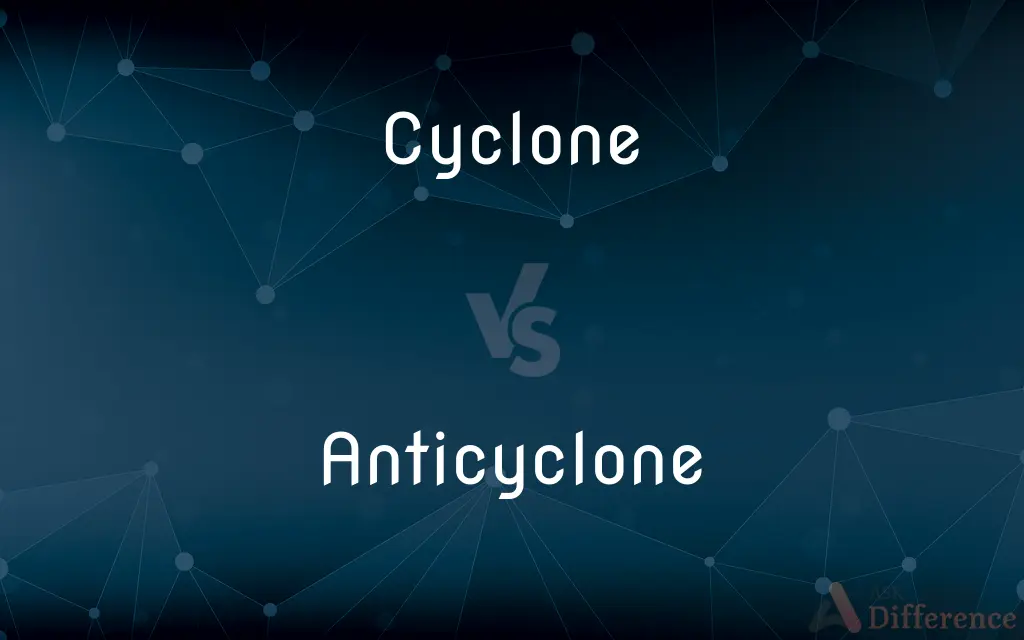Cyclone vs. Anticyclone — What's the Difference?
By Tayyaba Rehman & Maham Liaqat — Updated on April 2, 2024
A cyclone is a large scale air mass that rotates around a strong center of low atmospheric pressure, causing stormy weather, whereas an anticyclone is its opposite, rotating around a center of high pressure, bringing calm and clear skies.

Difference Between Cyclone and Anticyclone
Table of Contents
ADVERTISEMENT
Key Differences
Cyclones are characterized by inward spiraling winds that rotate counterclockwise in the Northern Hemisphere and clockwise in the Southern Hemisphere. This rotation is due to the Coriolis effect. They are often associated with bad weather, including heavy rain, thunderstorms, and in severe cases, hurricanes or typhoons. On the other hand, anticyclones involve outward spiraling winds that rotate in the opposite direction: clockwise in the Northern Hemisphere and counterclockwise in the Southern Hemisphere, typically resulting in calm weather conditions, clear skies, and lighter winds.
The formation of cyclones is driven by a combination of atmospheric disturbances, differences in temperature, and the Earth's rotation, leading to low pressure areas where air masses converge and rise. Whereas anticyclones form around high-pressure areas where air descends from higher in the atmosphere, spreading out at the surface, often leading to the dissipation of clouds and precipitation.
Cyclones can bring about significant changes in temperature and weather patterns, often bringing cooler air from higher latitudes towards the equator. This can result in a drop in temperature and increased precipitation. Anticyclones, however, tend to bring drier, warmer weather as they push air downward, warming it by compression and preventing the formation of clouds.
The impact of cyclones on the environment and human activities can be profound, including damaging winds, heavy rainfall leading to floods, and in extreme cases, loss of life and property. Anticyclones, while generally associated with more favorable weather conditions, can also lead to extreme weather events such as heatwaves or cold spells, depending on the season and the region.
Cyclones and anticyclones both play crucial roles in the Earth's weather systems and climate patterns. While cyclones are often seen as harbingers of destructive weather, they are also important for distributing heat and moisture globally. Anticyclones, though typically bringing clearer conditions, can contribute to extreme weather through prolonged periods of drought or cold.
ADVERTISEMENT
Comparison Chart
Rotation
Counterclockwise in the Northern Hemisphere
Clockwise in the Northern Hemisphere
Pressure Center
Low atmospheric pressure
High atmospheric pressure
Weather
Stormy, with heavy rain and winds
Calm, with clear skies and lighter winds
Temperature
Can bring cooler air towards equator
Tends to warm air by compression
Impact
Can cause floods, hurricanes, and damage
May lead to heatwaves or cold spells
Formation
Caused by atmospheric disturbances and temperature differences
Formed around descending air from higher atmosphere
Compare with Definitions
Cyclone
Often associated with storms and bad weather.
The cyclone caused unprecedented rainfall and flooding.
Anticyclone
Can lead to heatwaves or cold spells.
The persistent anticyclone caused a severe heatwave across the country.
Cyclone
Brings cooler air from higher to lower latitudes.
The cyclone disrupted the summer heatwave with cooler. stormy weather.
Anticyclone
Associated with clear skies and calm conditions.
Thanks to the anticyclone. outdoor events proceeded as planned.
Cyclone
Can lead to hurricanes or typhoons in severe cases.
The cyclone intensified into a Category 4 hurricane overnight.
Anticyclone
A weather system with high atmospheric pressure at its center.
The anticyclone led to a week of sunny. calm weather.
Cyclone
A system of winds rotating inward to an area of low atmospheric pressure.
The meteorologist warned of a cyclone approaching the coast.
Anticyclone
Rotates clockwise in the Northern Hemisphere.
The anticyclone's clockwise rotation brought dry weather to the region.
Cyclone
Impactful on both environment and human activities.
The cyclone left thousands without power and homes.
Anticyclone
Contributes to weather stability.
The anticyclone has kept the rainy season at bay longer than usual.
Cyclone
In meteorology, a cyclone () is a large scale air mass that rotates around a strong center of low atmospheric pressure, counterclockwise in the Northern Hemisphere and clockwise in the Southern Hemisphere as viewed from above (opposite to an anticyclone). Cyclones are characterized by inward-spiraling winds that rotate about a zone of low pressure.
Anticyclone
An anticyclone is a weather phenomenon defined as a large-scale circulation of winds around a central region of high atmospheric pressure, clockwise in the Northern Hemisphere and counterclockwise in the Southern Hemisphere as viewed from above (opposite to a cyclone). Effects of surface-based anticyclones include clearing skies as well as cooler, drier air.
Cyclone
A system of winds rotating inwards to an area of low barometric pressure, with an anticlockwise (northern hemisphere) or clockwise (southern hemisphere) circulation; a depression.
Anticyclone
An extensive system of winds spiraling outward from a high-pressure center, circling clockwise in the Northern Hemisphere and counterclockwise in the Southern Hemisphere.
Cyclone
An atmospheric system characterized by the rapid inward circulation of air masses about a low-pressure center, usually accompanied by stormy, often destructive weather. Cyclones circulate counterclockwise in the Northern Hemisphere and clockwise in the Southern Hemisphere.
Anticyclone
(meteorology) a system of winds that spiral out from a centre of high pressure
Cyclone
A violent tropical storm, especially one originating in the southwestern Pacific Ocean or Indian Ocean.
Anticyclone
A movement of the atmosphere opposite in character, as regards direction of the wind and distribution of barometric pressure, to that of a cyclone.
Cyclone
A violent rotating windstorm, especially a tornado.
Anticyclone
(meteorology) winds spiraling outward from a high-pressure center; circling clockwise in the northern hemisphere and counter-clockwise in the southern
Cyclone
Any of various devices using centrifugal force to separate materials.
Cyclone
(broad sense) A weather phenomenon consisting of a system of winds rotating around a center of low atmospheric pressure
Cyclone
(narrow sense) Such weather phenomenon occurring in the South Pacific and Indian Ocean
Cyclone
A low pressure system.
Cyclone
(informal) The more or less violent, small-scale circulations such as tornadoes, waterspouts, and dust devils.
Cyclone
A strong wind.
Cyclone
A cyclone separator; the cylindrical vortex tube within such a separator
Cyclone
To separate using a cyclone separator.
Cyclone
To storm as a cyclone.
Cyclone
To whirl in spirals as a result of a cyclone or whirlwind-like force.
Cyclone
To storm wildly; to be in a frenzy.
Cyclone
A violent storm, often of vast extent, characterized by high winds rotating about a calm center of low atmospheric pressure. This center moves onward, often with a velocity of twenty or thirty miles an hour.
Cyclone
In general, a condition of the atmosphere characterized by a central area of pressure much lower than that of surrounding areas, and a system of winds blowing inward and around (clockwise in the southern hemisphere and counter-clockwise in the northern); - called also a low-area storm. It is attended by high temperature, moist air, abundant precipitation, and clouded sky. The term includes the hurricane, typhoon, and tropical storms; it should not be applied to the moderate disturbances attending ordinary areas of low pressure nor to tornadoes, waterspouts, or "twisters," in which the vertical motion is more important than the horizontal.
Cyclone
A tornado. See above, and Tornado.
Cyclone
(meteorology) rapid inward circulation of air masses about a low-pressure center; circling counterclockwise in the northern hemisphere and clockwise in the southern
Cyclone
A violent rotating windstorm
Common Curiosities
What is a cyclone?
A cyclone is a large-scale air mass that rotates around a strong center of low atmospheric pressure, often causing stormy weather.
What is an anticyclone?
An anticyclone is a weather phenomenon characterized by a rotation around a center of high atmospheric pressure, typically bringing calm and clear weather.
Can cyclones affect the temperature?
Yes, cyclones can bring cooler air from higher latitudes towards the equator, affecting the temperature and weather patterns.
What determines the direction of rotation in cyclones and anticyclones?
The direction of rotation is determined by the Coriolis effect, which is influenced by the Earth's rotation and the hemisphere in which they occur.
How do anticyclones form?
Anticyclones form around high-pressure areas where air descends from the atmosphere and spreads out at the surface, leading to clear weather.
What are the effects of anticyclones?
Anticyclones are generally associated with calm weather, clear skies, and can sometimes lead to extreme weather conditions like heatwaves or cold spells.
Do anticyclones affect air quality?
Yes, anticyclones can lead to stagnation of air, resulting in reduced air quality and potential heatwaves.
Why do cyclones rotate differently in each hemisphere?
The difference in rotation is due to the Coriolis effect, which is caused by the Earth's rotation.
How do cyclones form?
Cyclones form due to atmospheric disturbances, temperature differences, and the Earth's rotation, leading to low pressure areas where air masses converge and rise.
What are the effects of cyclones?
Cyclones can cause heavy rainfall, storms, hurricanes, flooding, and significant damage to infrastructure and the environment.
How long can anticyclones last?
Anticyclones can last for several days to weeks, often leading to prolonged periods of stable weather.
What is the difference between a cyclone and a hurricane?
A hurricane is a type of cyclone that forms over warm tropical waters and reaches a certain intensity, while cyclones can occur in various regions and may not reach hurricane strength.
Are cyclones dangerous?
Yes, cyclones can be very dangerous, causing severe weather conditions like heavy rain, strong winds, and flooding, which can lead to loss of life and property.
How do anticyclones and cyclones affect climate?
Both play significant roles in the Earth's climate system, with cyclones helping to distribute heat and moisture globally, while anticyclones contribute to weather patterns and extremes.
Can anticyclones bring rain?
While anticyclones are typically associated with dry weather, certain conditions can lead to precipitation, especially around the edges of the high-pressure system.
Share Your Discovery

Previous Comparison
Goth vs. Punk
Next Comparison
Conjecture vs. HypothesisAuthor Spotlight
Written by
Tayyaba RehmanTayyaba Rehman is a distinguished writer, currently serving as a primary contributor to askdifference.com. As a researcher in semantics and etymology, Tayyaba's passion for the complexity of languages and their distinctions has found a perfect home on the platform. Tayyaba delves into the intricacies of language, distinguishing between commonly confused words and phrases, thereby providing clarity for readers worldwide.
Co-written by
Maham Liaqat














































